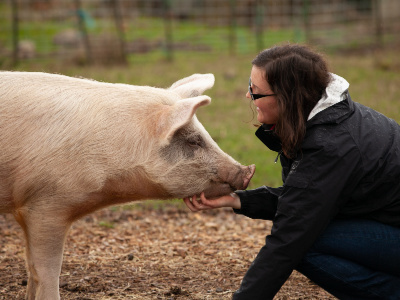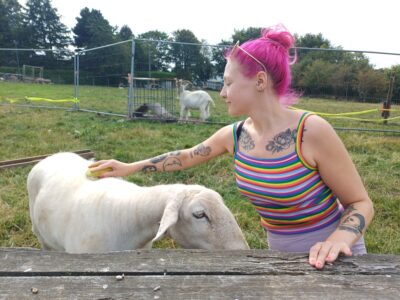A recent study reveals goats have the ability to recognise, and show preference towards, specific human emotions. But what does this mean for other domesticated and commercialised animals?

You might have heard whisperings in the news over the past few days surrounding a study published in the Royal Society for Open Science.
The research by scientists at Queen Mary University London is the latest big, headlining story surrounding animal psychology.
The study performed by Nawroth et. al investigated whether farmed goats possess the cognitive abilities to discern, and indeed show preference towards, images of human faces expressing different states of emotion (either positive or negative).
Animals Prefer Happier, Positive Human Emotions
The goats were given the choice between approaching images of either happy (positive) or angry (negative) human faces.
The researchers discovered that goats reliably approached the images of happy human faces first, displaying a distinct preference towards positive emotions when approaching the images if placed in their visual field corresponding to emotive recognition.
What’s more, the goats tended to spend a longer period of time in front of the positive images of human faces, as compared to the negative ones. The researchers go on to suggest that preference toward happy, positive human faces could be as a result of attempts to actively reduce their proximity to angry human faces.
The paper comments:
“We have shown that animals that have been primarily domesticated for food production are capable of perceiving information from humans, in a similar manner to companion animals such as dogs.”
Co-author of the paper, Dr McElligott, told the BBC:
“The study has important implications for how we interact with livestock and other species, because the abilities of animals to perceive human emotions might be widespread and not just limited to pets.”
Research into Animal Emotion is Both Significant and Important
Whilst such findings provide interesting reading over a morning coffee, there is a much more significant message hidden behind the almost-comical headlines created by newspapers around the world.
The research helps support the idea that non-human species also possess the ability to discern emotions, a key argument in support of animal welfare and animal rights activism.
If animals are capable of reading human emotions, and are able to differentiate between positive and negative faces, what does this mean for those who are commercialised for human use?
Skewed Perspectives
Given that this compelling research provides such clear, critical insight into the inner workings of our fellow creatures’ minds, it comes as a great disappointment that these results could be interpreted in a way which would further exploit and harm them.
The Telegraph chose to report the findings from the aforementioned study in such a light:
“Farmers should ‘smile’ at their livestock to produce better meat”
With the latest harrowing footage from a dairy farm supplying Waitrose, and news of severe cruelty at a so called “high-welfare” pig farm, this headline left us feeling a little outraged.
Rather than focusing on the animal’s intelligence and insight, skewing such findings to the benefit of animal exploitation is far from the intent of research into cognitive-behavioural psychology of animals.
Despite common misconception, the domestication of animals for human use is not something which has been hard-wired into the DNA of our fellow creatures.
Advances in animal psychology are consistently revealing that these animals are intelligent, and have the potential to learn from humans, particularly via imitation. This is particularly true of social animals such as pigs, goats and sheep – all of which are domesticated for human use.
Evidence of animals’ higher-level cognitions should rather be interpreted as bettering our progressive understanding of their internal emotional lives.
The more we discover about the ways in which our fellow animals interact within our environment, the better we understand the inner workings of their silent worlds, and the more we can comprehend the negative social-emotional implications that domestication and commercialisation brings upon them.
Want to end the exploitation and commercialisation of animals? Take our Vegan Pledge Here.
THIS BLOG WAS WRITTEN IN 2018











































